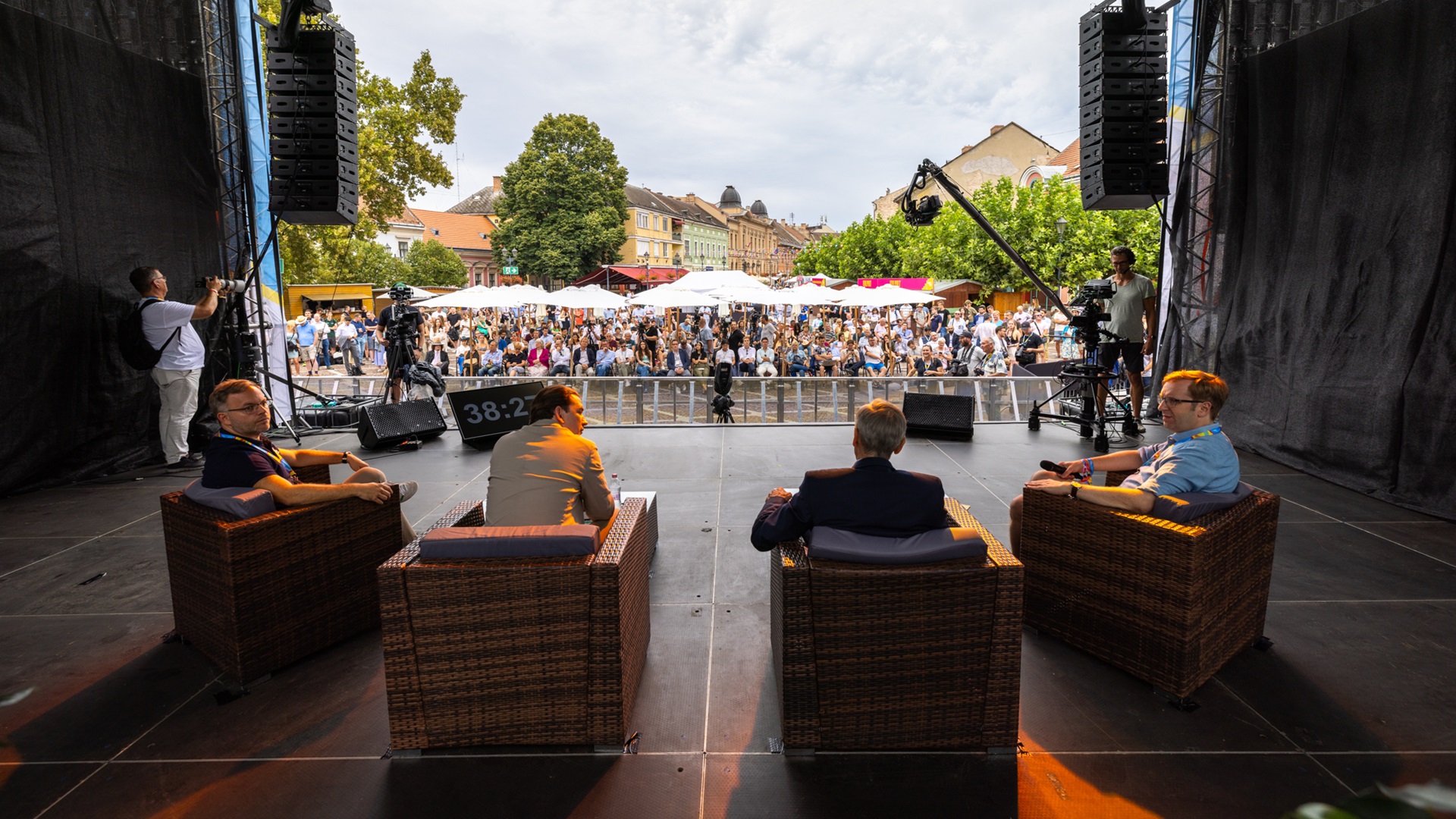The fourth edition of MCC Feszt in Esztergom, Hungary is taking place between 1 and 3 August this year. Director General Zoltán Szalai said in his opening address that they are hopeful they will be able to break last year’s attendance record of 40,000 people. He then assumed the role of the moderator of the first panel discussion of the festival.
The participants were Sebastian Kurz, the former Chancellor of Austria; Balázs Orbán, the political director of the Prime Minister of Hungary; and Ján Figeľ, former European Commissioner for Education, Training, Culture and Youth from Slovakia. The topic of discussion for the afternoon was the results of the recent European Parliamentary election.
Chancellor Kurz started off the discussion by saying that, despite some headlines in international media referring to the results as a ‘big revolution,’ he would not classify them as such. He believes it was ‘just’ a shift to the centre-right and the far-right in Europe, with parties on that side of the spectrum netting a 23-seat gain in the EP. The biggest losers, as he pointed out, was the Greens/EFA alliance, which lost 20 per cent of its seats.
Mr Figeľ shared his appreciation for the Mathias Corvinus Collegium’s efforts in organizing the festival; as well as the namesake of the institution, Mathias Corvinus, who, as he pointed out, is a well-regarded historical figure in his home country of Slovakia as well. He also talked about how he believes there is a disconnect between the way politics is run on the national and the European level, with Brussels not always acting in accordance with the will of the people. He was the first to bring up the Russo–Ukrainian war in the discussion, saying
‘the EU was, and remains to be a peace project’
on the topic.
Mr Orbán told the audience that not just the results, but the mindset of the voters also mattered in the recent elections. For example, he believes that even someone who voted for the centrist CDU party in Germany was casting a protest vote against the incumbent Brussels leadership.

He also talked about how the weakening of the national leadership in the two major European countries, Germany and France, as well as the United Kingdom’s exit from the Union, prompted the European Commission, led by Ursula von der Leyen, to take on the role of ‘the resolver of Europe’s problems’ and be the key decision maker in the EU’s geopolitics. The director than lamented the fact that after the elections in June, the EPP turned on their own voters and re-elected von der Leyen as the President of the Commission. However, he said he is still optimistic about the direction European politics is going, stating:
‘The time of peace is coming, the time of closed borders is coming.’
The moderator then asked about the ‘cordon sanitaire’ erected around the MEPs of the newly formed, right-wing populist Patriots for Europe group, led by Prime Minister Viktor Orbán of Hungary’s Fidesz party.
Mr Figeľ answered that a representation deficit is a democracy deficit, and barring populist, elected officials from taking important positions will have a long-term detrimental effect on the EU. Chancellor Kurz, however, was of the opinion that while these positions are important, what is more important is that the populist right was able to change the nature of public discourse in Europe. He pointed out that advocating for stricter border control was viewed as a ‘fascist,’ far-right position at the start of the migrant crisis in 2015, but now it is a mainstream position on the right and even among some centre-left politicians. Mr Orbán pushed back some on that notion, drawing attention to the fact that Hungary was recently fined by the European Court of Justice for not meeting migration quotas.
Returning to the topic of the Russo–Ukrainian war, Chancellor Kurz opined that peace negotiations will be very difficult even if President Donald Trump wins the US presidential election in November, since Ukraine will likely not be willing to give up any of its territories, while Russia will likely insist on annexing at least some of the Ukrainian territories it currently occupies. Meanwhile, Mr Orbán criticized the Brussels leadership for pretending that their old strategy on the war is still working, and for still hoping to be able to force a regime change in Russia.
Related articles:







